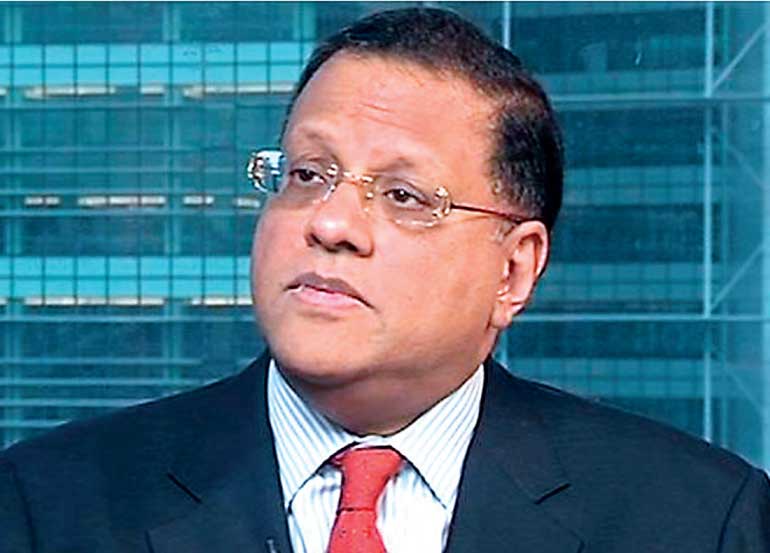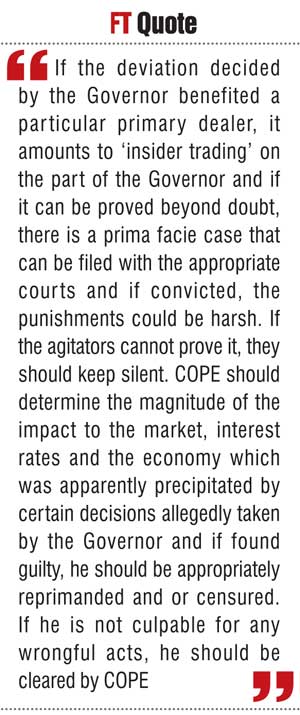Tuesday Feb 17, 2026
Tuesday Feb 17, 2026
Wednesday, 29 June 2016 00:00 - - {{hitsCtrl.values.hits}}

Central Bank Governor Arjuna Mahendran
By Janitha Devapriya
The hot topic now doing the rounds is whether the Central Bank Governor would be reappointed when his term ends on 30 June. There is no dearth of ‘judges’ who have already passed judgment against the Governor on account of the Treasury bonds saga of 27 February 2015. This includes politicians of many hues, professionals in the field of finance, some bankers and a myriad of other so-called experts.
The Prime Minister has categorically stated that Arjuna Mahendran will not be reappointed as Governor Central Bank until the COPE inquiry is concluded. This is a very prudent decision on the part of the PM. Mahendran himself has informed the Monetary Board that he is not seeking an extension of the term of office until his name is cleared by COPE. The question arises then, why many are now shouting from their rooftops that the Governor should go.
It will be very interesting to find out whether those shouting hoarse are fully aware of how the bond market operates and what really transpired in the impugned bond auction, whether they were able to study the intricate transaction details, the audit trails and whether their estimation of the alleged loss is based on proper calculations taking into account the time value of money applying for example, the rule of 72*, etc., as practiced by reputed financial experts and dealers the world over.
Quite often such estimations are based on speculation since the bond prices depend to an extent on the perception the players in the market hold in addition to the declared yields and the demand and supply considerations. So the observations of the so-called experts and their inferences are not absolute and often liable to change due to the volatility of the market.
Going a step further, one can observe that the Central Bank deviated from the position taken earlier to offer 30-year bonds up to Rs. 1 billion on 27 February 2015 by auction and instead opted to go for the auction of Rs. 10 billion bonds on a weighted average yield rate (WAYR) ranging from 9.3510 to 11.7270. This deviation was said to have been decided by the Tender Committee on a directive from the Superintendent of Public Debt Department (PDD) who it was believed had acted on the Governor’s instructions.
The circumstances surrounding the now notorious bond sale poses questions which need answers:
 1. Whether the decision to go for the auction of Rs. 10 billion instead of the previously announced Rs. 1 billion was taken on the day of the auction?
1. Whether the decision to go for the auction of Rs. 10 billion instead of the previously announced Rs. 1 billion was taken on the day of the auction?
2. Was this fact known only to the Governor, if not who else in the Central Bank was privy to this fact?
3. It was alleged that the Governor visited the PDD when the bids were being processed by the department. Is there any evidence that he gave specific instructions to the officials in selecting the bids?
4. Was the Governor present when the Tender Committee was evaluating the bids received? If the answer is yes, is there any evidence that he indicated to the tender committee, his desire that a particular bid be considered over the others?
5. It is known that the Bank of Ceylon, itself a primary dealer, making bids on behalf of another primary dealer, Perpetual Treasuries, requested an extension of 10 minutes from the closing time as they apparently had several large offers on their hands. Who took the decision to extend the closing time by 10 minutes and on what grounds? Was there a higher authority who instructed that such an extension be granted?
6. By opting to go with more transparent public auction (among the primary dealers) method instead of the earlier oft-practiced private placements, what is the impact on the interest rates, the bond market and the economy as a whole?
I contend that the vociferous critics should find answers to these questions. If the deviation decided by the Governor benefited a particular primary dealer, it amounts to ‘insider trading’ on the part of the Governor and if it can be proved beyond doubt, there is a prima facie case that can be filed with the appropriate courts and if convicted, the punishments could be harsh. If the agitators cannot prove it, they should keep silent.
COPE should determine the magnitude of the impact to the market, interest rates and the economy which was apparently precipitated by certain decisions allegedly taken by the Governor and if found guilty, he should be appropriately reprimanded and or censured. If he is not culpable for any wrongful acts, he should be cleared by COPE.
JVP Media Secretary Vijitha Herath went to the extent of stating that the notorious bond transaction was a fraudulent bond deal and they have observed certain sinister facts coming out in the COPE investigations. It is a bad reflection on COPE Chairman Sunil Handunnetti when people can erroneously conclude that Herath’s revelations are based on information gleaned from his colleague, the COPE Chairman. For him to term the bond issue as fraudulent without facts or proof yet is unbecoming for a responsible MP who should not fall into the category of MPs who impeached the former Chief Justice, Shirani Bandaranayake, without allowing her an opportunity to defend herself.
What we now witness is a circus going all out to ostracise Arjuna Mahendran through the media without proper investigations being concluded and to convict him by prejudging his actions like in a kangaroo court.